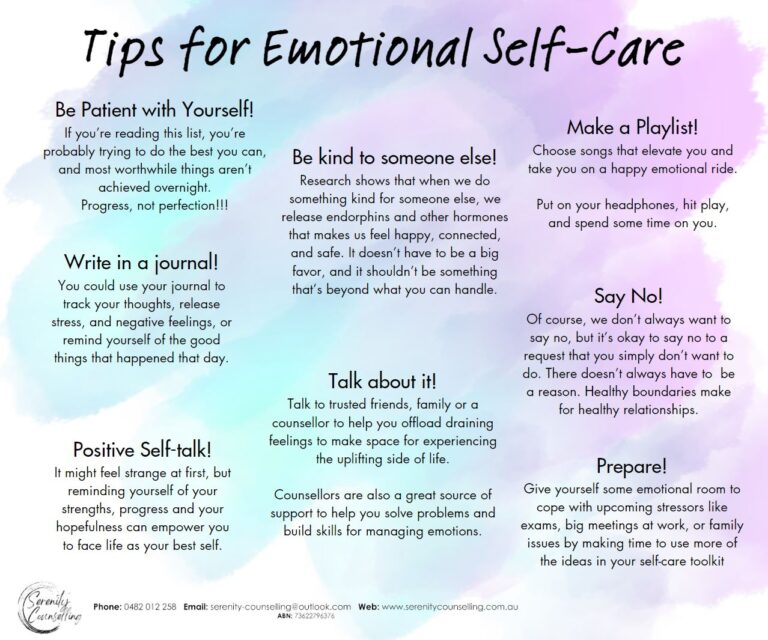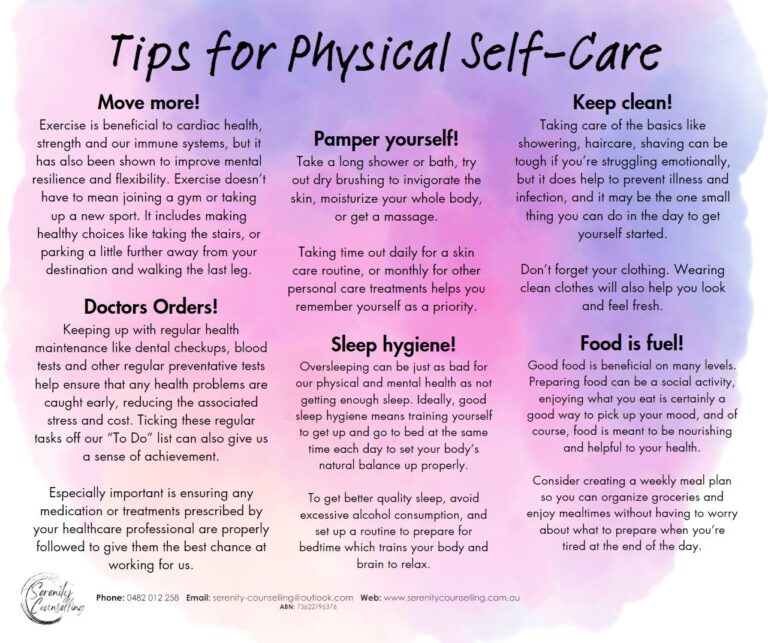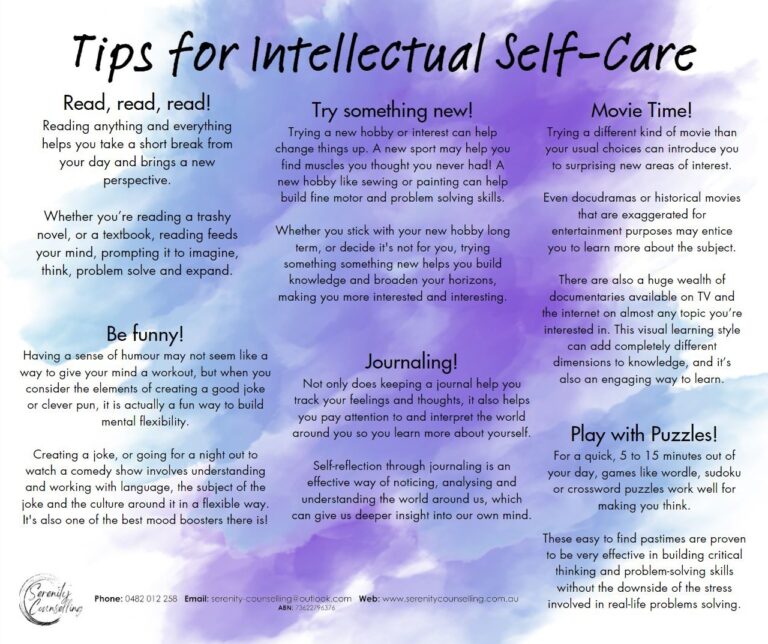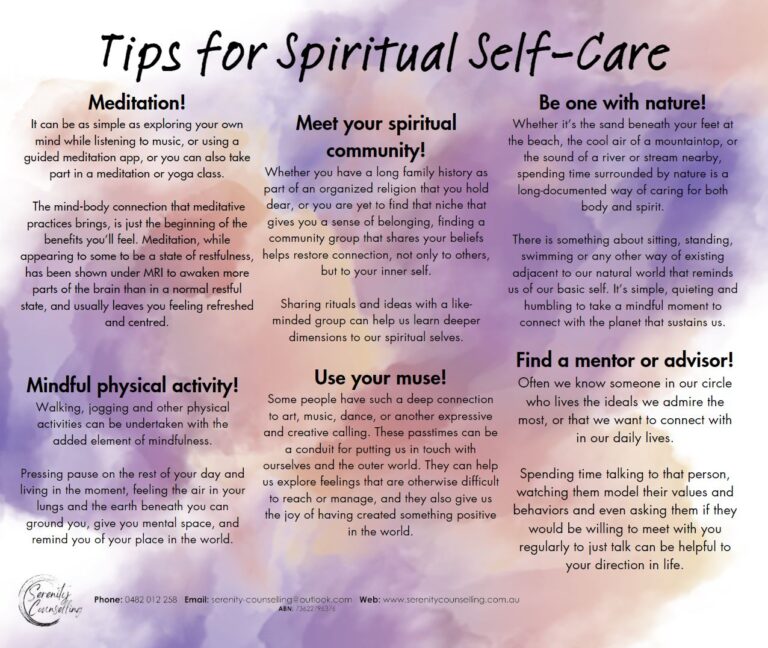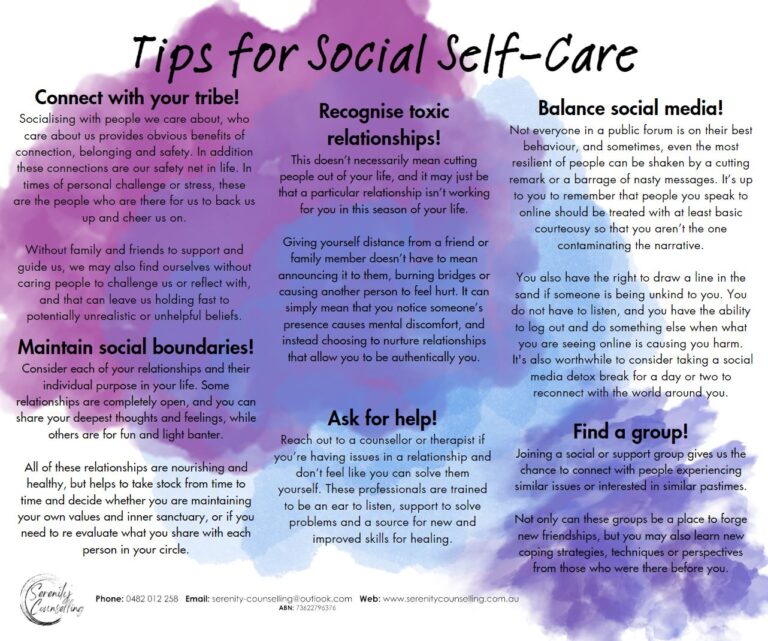In this Serenity Series, we’ll shine a light on self-care, what it is, why we do it, and how to achieve it.
In this series we’ll look at 5 areas of self-care:
- Emotional
- Physical
- Psychological/intellectual
- Spiritual
- Social.
Each part of this series focusses on different aspects that might be helpful in your ongoing journey to care for yourself, supporting you to either achieve, recover, or simply be the best you that you can be.
The first slide of this series focusses on Emotional self-care. Here we are working towards healthy coping skills, dealing with uncomfortable feelings and expressing our feelings in safe and helpful ways.
Read more about Emotional Self Care
So, why is self care so important?
The easy example to think of is on a plane, where we are all told each time we fly, that in the event of an emergency, we should be securing our own oxygen mask before helping others.
The reason for this is clear: if we can’t breathe, not only will we not survive, but we will also be unable to help those around us.
Self-care works like this too. By taking these preventative maintenance measures on a regular basis, we prevent some negative effects from stress, burnout and life challenges, we become stronger so that anything that comes our way is much less likely to cause us problems, and we are also mentally balanced, so that we can enjoy our lives more fully.
Remember: Self-care is not selfish!
The second topic of focus is physical self-care. A wealth of studies show that not only is this important for staying physically healthy, but it also has profound and long reaching effects on our mental wellbeing. After all, the brain is a part of the physical body, so it makes sense to care for it, so that it can serve us long into the future.
Read more about Physical Self-care
Planning for Self-care
Managing the routines and resources you need to make the task of looking after yourself part of everyday life can be overwhelming, and this is where self-care planning can be effective in helping us build balanced and healthy lifestyles. Using tools to manage and monitor what we need to do, and how effective our efforts are can take away some of the stress of this.
Technology such as electronic calendars, smartphones and watches can help you plan reminders and alerts for taking medication, scheduling appointments, and planning down time for yourself. Apps are also useful for everything from remembering to drink water regularly to providing guidance for meditation and self-talk.
A person-centred counsellor is well equipped to help you create an effective, individualised plan that suits your lifestyle.
Intellectual self-care may not be something you’d thought of before, but it is a crucial part of maintaining hopefulness and motivation.
By exercising our minds, building new skills and knowledge and staying open and curious, we tend to be more connected to the world around us and we’ll be more likely to be positive and withstand life’s challenges.
Read more about Intellectual Self-care
The power of your mind
Another big benefit of maintaining your intellectual self-care is a greater sense of purpose in life. Your self-care planning should be tailored to fit what works for you, and this not only includes the things that you like to do, or that you have the resources for, but it should also include things that fit with your values. For example, if one of your core values in life is family, then perhaps one intellectual self-care strategy could be planning a trip to somewhere new once a year and visiting some interesting landmarks, or learning a new language and culture together.
Something closer to home may be teaching a family member a new skill, so not only do you reinforce that knowledge for yourself, but you are building family bonds in the process.
If you’re feeling as though motivation is low, or you’re just going through the motions, consider whether you have included enough intellectual self-care aspects in your life to ignite your inner spark again.
There are almost as many ways to experience spiritual self-care as there are people in the world. At its core though, this kind of self-care is focused on helping us to connect with our true selves, whilst also connecting with something larger than us.
Read more about Spiritual Self-Care
Loneliness and reconnection
In practical terms, spiritual self-care takes place within the rituals and practices that are meaningful and sacred to you, helping you find a space within yourself where you have faith in your place in the universe.
Regardless of how you approach this all important aspect of self-care, the healing benefits to mind, soul and body are proven by numerous empirical studies. With practice, it is possible to teach our minds greater control over our feelings, to calm our inner turmoil, and make the behavioural changes we know will best help us in life. Spiritual self-care is key to improved outcomes for physical health by calming our entire nervous systems which then lets us redirect our resources to healing processes instead of protecting us from stress.
Loneliness is also an issue that spiritual self-care can provide a salve for. Being part of a religious or spiritual community or meeting with people who share your values can help you feel much less isolated. Being in touch with your own belief systems, and inner spirituality can also help you feel more comfortable in your own company, which reduces feelings of loneliness.
Counselling can help put you back in touch with yourself and it can also help you plan for self-care activities that are holistic and rejuvenating.
In the final part of the self-care series, we take a look at social self-care. Humans are herd animals, meaning that we inherently need each other and our relationships to survive and thrive. Even the most introverted of us benefits from their links to other people.
From our family bonds, close friendships, acquaintances and professional relationships, these connections can build us up and strengthen us, or they may be a source of stress. If you feel this is the case, it might be time to rethink your social balance, and perhaps seek some professional advice to improve your relationships with yourself and others.
Read more about Social Self-Care
What Self-Care is not
Throughout this Serenity Series on self-care, there have been plenty of suggestions on what you can do to nurture yourself and why that is so important to your entire wellbeing.
It’s also important to consider what sorts of activities are not self-care, despite feeling good in the moment or appearing to be self-care practices.
Some examples of what self-care is not are:
-
Spending unplanned money on unnecessary impulse buys, especially when that money is earmarked for bills and other living expenses.
-
Making unrealistic self-care plans such as going from no daily exercise regime to an hour a day, 7 days a week. This is particularly harmful when it’s followed by feeling guilty when you don’t stick with it.
-
Deciding to bail on social plans with friends so that you can binge watch TV alone (once in a while this may be okay, but a pattern of doing this can mean there is an underlying problem).
Remember, if you are struggling to balance your self-care, reach out and seek support rather than going it alone!
